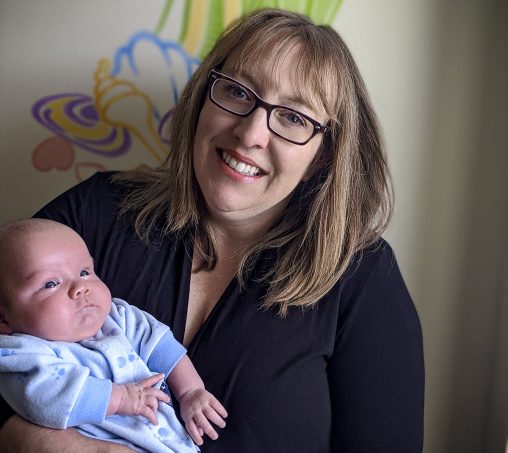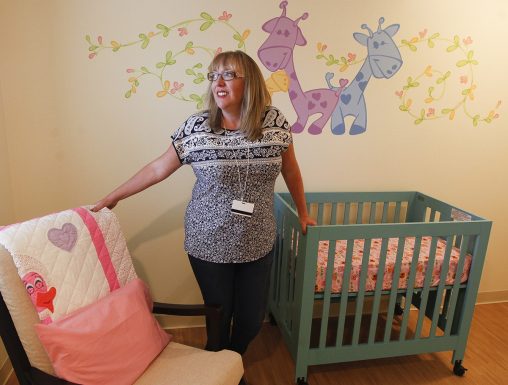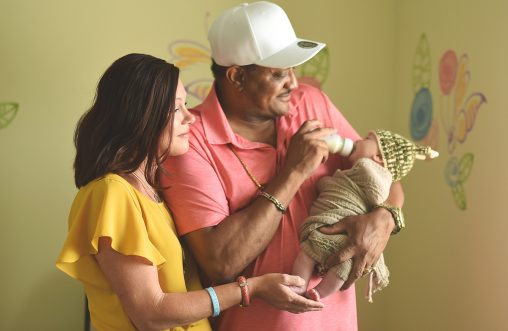
Jill Kingston, who earned her master’s degree in education from Wright State, founded Brigid’s Path, a nonprofit organization that treats and cares for babies with prenatal exposure to illegal or prescribed substances.
Jill Kingston ’01 and her husband, Nick Kingston ’04 and ’09, wanted a big family. But after having three children of their own, Jill learned she could not carry any more babies. Nick, who had been adopted through foster care, suggested they become a foster family.
They decided to foster newborns. Their first foster baby was born substance-exposed and weighed just 3.5 pounds.
“We quickly realized he would need different care than we were used to providing our own newborns,” Kingston said. “Without formal training, we learned how to soothe him, meet his needs, and ease his pain.”
Three weeks later, the Kingstons were contacted about another substance-exposed baby who needed a place to stay.
Kingston described being foster parents as a journey of faith and the most rewarding experience of their lives. It’s not always easy, she said, but surrounding children with love and support has made every moment worth it.
“We feel honored to be able to bring children into our home, even for a short time, and to be able to surround each child with love and safety,” Kingston said. “We have been blessed in so many ways, and we want to be able to share with others.”
But Kingston also realized how many families needed help. The parents of substance-exposed babies were heartbroken, ashamed, and overwhelmed. In the NICU, Kingston saw nurses were forced to triage between very ill babies and those who were crying only because of their withdrawal.
“When we fostered two babies born exposed to addictive substances, I knew there had to be a better way to care for these children—and their families,” said Kingston, who earned her master’s degree in education from Wright State University in 2001.
She felt called by God to find a way to make a difference. “I had no idea how to make it happen,” she said. “I just kept praying and asking people for help.”
In 2017, Kingston opened Brigid’s Path, a nonprofit organization in Kettering that treats and cares for babies with prenatal exposure to illegal or prescribed substances, including opioids. Today, Brigid’s Path has cared for more than 80 babies, while providing resources to help parents.
Brigid’s Path was the first facility in Ohio and only the second in the nation to offer an in-patient, home-like approach. The facility offers a calm, low-stimulation environment that, combined with medicinal and nonpharmacological techniques, keeps babies as comfortable as possible while they experience withdrawal.
“We believe that creating this environment of calm is good for our babies and our families,” Kingston said. “It’s quiet and supportive. They can relax here.”
Kingston was encouraged to attend Wright State by her older sister, Trisha Witzerman ’95 and ’00, who also earned education degrees from the College of Education and Human Services. Kingston was attracted to the university because it offered a one-year master’s program in education with a cohort of students.
“I loved the community of people in my cohort I worked with every day,” she recalled. “They became like a family to me.”
She also loved the one-on-one attention her professors were able to provide. “They really cared about my success,” she said.
Family continues to run deep at Wright State for Kingston. Her cousin Jake Slemker is the head coach for the men’s soccer team, and her brother-in-law Michael Witzerman coached co-ed cheerleading for many years.
As a student at Wright State, Kingston taught second grade at CF Holliday Elementary in West Carrollton. After she graduated, she taught home economics at Smith Middle School in Vandalia.
Kingston then left teaching to stay at home with her children. During this time, she started operating The Sitter Connection, which placed nannies and babysitters in Dayton, Cincinnati, and Columbus, running the business from 2003 to 2014.
While Brigid’s Path is not affiliated with a religious denomination, the organization’s name comes from St. Brigid, the patron saint of newborns, and Psalm 25 (“Show me your ways, Lord, and teach me your paths”).
It took Kingston a couple of years to do the research, fundraising, licensing, and other steps needed to open Brigid’s Path. At the same time, the number of babies going through substance withdrawal was growing quickly across Ohio.
The babies treated at Brigid’s Path come from every socioeconomic status, race, ethnicity, and culture, and are from throughout the state. The babies have Neonatal Abstinence Syndrome, a group of conditions faced by newborns exposed to an addictive substance. Prenatal exposure can cause babies to experience withdrawal upon birth. Symptoms include sleep problems, irritability, tremors, trembling, seizures, high-pitched crying, diarrhea, vomiting, low birth weight, stuffy nose, feeding difficulties, dehydration, sneezing, sweating, and breathing problems.
Brigid’s Path’s facility is unique. It features three sets of nurseries, each with a common area and private rooms for the babies. The space is dimly lit, quiet, and calm. Cell phones are not allowed in the nurseries. Nurses, personal care assistants, volunteers, and parents work together to care for the babies. Someone is always available to immediately respond to a baby’s needs.
“We [provide] comfort and support at a crucial time of their development,” Kingston said.
Care is focused on healing and helping parents, caregivers, and babies bond.
“At Brigid’s Path, our team is family centered,” Kingston said. “We want mothers, fathers, and babies to have a safe, home-like place to establish their bond and begin their life together. We encourage mothers to room with, care for, and bond with their babies as much as possible.”
To help babies be as comfortable as possible while they experience withdrawal, the staff employs both medicinal and nonpharmacological techniques, including responding immediately to their physical needs, cuddling, rocking, and small and frequent feedings. As the babies grow older, the staff continues to provide developmentally appropriate care like tummy time, playtime, and reading books together.
Because of focused attention and nonpharmacological care, the babies need less medication to support their withdrawal, Kingston said. “We have never had to give a rescue dose of medication. We have never delayed a weaning,” she said.
The quiet environment at Brigid’s Path and caring approach works. Kingston points out that the organization’s assessments of the common signs of neonatal drug withdrawal are routinely lower than hospital assessments.

Jill Kingston encourages others to follow their calling and make a difference in the world. (Photo by Chris Stewart; courtesy of the Dayton Daily News)
Babies stay at Brigid’s Path up to 90 days, and during that time, the staff works with mothers and fathers to connect with the resources they need to figure out what comes next for their families.
A family advocacy team works with each mother to establish meaningful goals based on her strengths. Family advocates also provide ongoing support, even after a family is discharged from Brigid’s Path; they help obtain birth certificates, work with children’s services, attend court and probation hearings, and coordinate care with providers.
Brigid’s Path does not provide in-patient treatment for mothers facing issues of addiction, but the staff works with community partners to provide resources to help mothers achieve the stability that will help them care for their children for both the near and long term.
“Brigid’s Path is a safe place for our families and free of judgment,” Kingston said. “Every woman can be a great mother, and we want to help each mom who passes through our doors to feel safe, hopeful, and prepared for the future.”
Overall, about 77 percent of Brigid’s Path’s funding has come from private individuals, foundations, and grants, with the rest from contributions and grants from local and state agencies.
Kingston said the organization continues to dream big as it looks to the future. Exploring supportive housing options and daycare for the families are possibilities. “It is our goal to find even bigger ways to impact our community by helping families,” she said.
Kingston encourages others to follow their calling.
“If anyone feels called to make a difference in the world, do it! Even if it seems like something impossible or you’re not sure exactly how to do all the steps,” she said. “Things will be difficult, and things won’t always go the way you planned, but it will always be worth it!”
For more information, visit brigidspath.org.
This article was originally published in the fall 2020 issue of the Wright State Magazine. Find more stories at wright.edu/alumnimag.


 Nearly 1,500 students graduate at Wright State’s spring commencement ceremonies
Nearly 1,500 students graduate at Wright State’s spring commencement ceremonies  Wright State University and Premier Health more closely align operations, creating a transformational partnership
Wright State University and Premier Health more closely align operations, creating a transformational partnership  Bottom Line, Wright State partnership aims to increase access to college
Bottom Line, Wright State partnership aims to increase access to college  Wright State’s nursing program celebrates 50th anniversary
Wright State’s nursing program celebrates 50th anniversary  Wright State celebrates Student Success Champions
Wright State celebrates Student Success Champions 